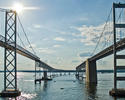In a move that will surprise no one at all, Congress has extended federal funding for highways and public transit until September 30, 2021. Such federal funding was set to end on September 30, 2020, and rather than revise the law to take into account the latest trends and events, Congress simply extended the existing law for another year. read more »
Washington DC
A Law and Order Platform to Unite Working-Class Voters
Donald Trump has positioned himself as the “law and order” president, because the term provides a positive framing for the racially-tinged rhetoric he uses to divide members of the white working and middle classes from people of color. read more »
- Login to post comments
Dissecting Black Suburbia
By now, everyone who's paid attention to the Trump Administration lately knows that the suburbs, however defined, look to figure very prominently in the 2020 presidential election. read more »
- Login to post comments
Why the 2020 Election Will be Decided in Suburbia
American politics is increasingly about dueling geographies. Democrats have become the party of the nation’s cities, while the Republican Party finds its base in rural, small town and low-density exurban America read more »
- Login to post comments
The Twilight of Great American Cities is Here. Can We Stop It?
The dreadful death of George Floyd lit a fire that threatens to burn down America’s cities. Already losing population before the pandemic, our major urban centers have provided ideal kindling for conflagration with massive unemployment, closed businesses and already rising crime rates. read more »
- Login to post comments
COVID Work Trip Reduction Estimates: CSAs with Transit Legacy Cities
America’s elite central business districts have symbolized the ascendency of big cities, epitomized by soaring office towers. But today, due the COVID-19 pandemic, so much office work performed in these CBDs can be done remotely, that their future seems far less towering than in the past. In contrast, less dense areas, notably exurbs, appear to have suffered less loss in their employment patterns. read more »
- Login to post comments
America's Long Suffering Rail Commuters
The long, streaking commuter trains (suburban rail) carrying workers mostly into and out of downtown every day may give the impression of “rapid transit.” However, regardless of the top speeds they reach, the average suburban rail rider spends far more time traveling to work than those using other modes of getting to work (Figure 1). They spend far longer than the majority of commuters, who drive alone. Even in the New York combined statistical area (CSA), with the largest suburban rail network a majority drive to work (Figure 2). read more »
High Speed Rail: Yesterday's Tech Tomorrow
One of the candidates for president in this November’s election is known by the nickname, “Amtrak Joe.” The Democratic-controlled House wants to triple federal funding for intercity passenger trains. read more »
- Login to post comments
State of the Nation on July 4 and How It Has Changed Over Time
Coronavirus, a shattered economy, racial tensions, deep partisan polarization. Is it any surprise that Americans are down in the dumps? How could it be otherwise? Putting today’s sentiments in historical perspective using polls conducted over many years helps to assess our current malaise. read more »
- Login to post comments
What's So Magic About $1 Trillion
News reports say that the Trump Administration is going to propose a $1 trillion infrastructure plan to “boost the economy.” One writer says it will not only promote recovery but also help the environment. read more »
- Login to post comments






















